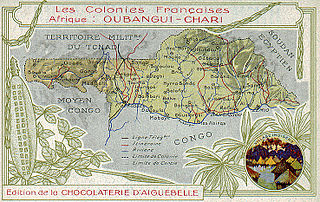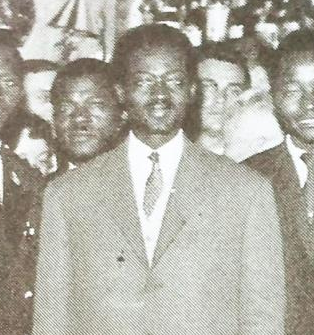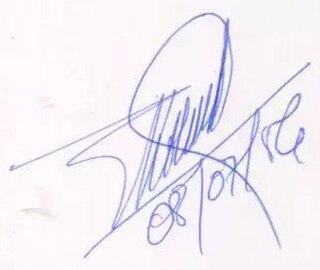Related Research Articles

The history of the Central African Republic is roughly composed of four distinct periods. The earliest period of settlement began around 10,000 years ago when nomadic people first began to settle,farm and fish in the region. The next period began around 10,000 years prior.

François BozizéYangouvonda is a Central African politician who was President of the Central African Republic from 2003 to 2013. He was also the only Central African president born in modern day Gabon.

Ange-Félix Patassé was a Central African politician who was president of the Central African Republic from 1993 until 2003,when he was deposed by the rebel leader François Bozizéin the 2003 coup d'état. Patasséwas the first president in the CAR's history to be chosen in what was generally regarded as a fairly democratic election (1993) in that it was brought about by donor pressure on President AndréKolingba and assisted by the United Nations Electoral Assistance Unit.

David Dacko was a Central African politician who served as the first President of the Central African Republic from 14 August 1960 to 1 January 1966 and as the third President of the Central African Republic from 21 September 1979 to 1 September 1981. He also served as Prime Minister of the Central African Republic from 1 May 1959 to 14 August 1960. After his second removal from power in a coup d'état led by General AndréKolingba,he pursued an active career as an opposition politician and presidential candidate with many loyal supporters;Dacko was an important political figure in the country for over 50 years.

Abel NguéndéGoumba was a Central African politician. During the late 1950s,he headed the government in the period prior to independence from France,and following independence he was an unsuccessful candidate for President of the Central African Republic four times. Goumba,who was President of the Patriotic Front for Progress (FPP) political party,served under President François Bozizéas Prime Minister from March 2003 to December 2003 and then as Vice President of the Central African Republic from December 2003 to March 2005. Subsequently,he was appointed to the official post of Ombudsman.

André-DieudonnéKolingba was a Central African politician,who was the fourth President of the Central African Republic (CAR),from 1 September 1981 until 1 October 1993. He took power from President David Dacko in a bloodless coup d'état in 1981 and lost power to Ange-Félix Patasséin a democratic election held in 1993. Kolingba retained the strong support of France until the end of the Cold War in 1992,after which both internal and external pressure forced him to hold presidential elections which he lost.

General elections were held in the Central African Republic on March 13,2005 to elect the President and National Assembly. A second round was held for both elections on May 8,marking the end of the transitional process that began with the seizure of power by François Bozizéin a March 2003 coup,overthrowing President Ange-Félix Patassé. A new constitution was approved in a referendum in December 2004 and took effect the same month.
Simon Narcisse Bozanga was a Central African politician. He was Prime Minister of the Central African Republic from 4 April 1981 to 1 September 1981,when his government was overthrown by a military coup.
Jean-Jacques Démafouth is a political leader in the Central African Republic. He is a former Defense Minister,Presidential candidate,and is the current political leader of the APRD rebel group. He led the peace delegation of the APRD to talks with the government in December 2008.

Michel Am-Nondokro Djotodia is a Central African politician who was President of the Central African Republic from 2013 to 2014. He was the first Muslim to hold that office in the predominantly Christian country. Djotodia was a leader of the almost entirely Muslim Séléka rebel coalition in the December 2012 rebellion against President François Bozizé. Following a peace agreement,Djotodia was appointed to the government as First Deputy Prime Minister for National Defense in February 2013. When the peace agreement unravelled,Séléka captured Bangui and Djotodia took power on 24 March 2013. He promised to lead a transition to new elections in which he would not be a candidate,but his time in office was marked by escalating sectarian violence,and he was ultimately pressured into resigning by regional leaders on 10 January 2014.

The Central African Republic Civil War is an ongoing civil war in the Central African Republic (CAR) involving the government,rebels from the Séléka coalition,and Anti-balaka militias.

Catherine Samba-Panza is a Central African politician who served as Transitional President of the Central African Republic from 2014 to 2016. She is the first woman to serve as head of state in the Central African Republic. Prior to her tenure as acting president,she was the Mayor of Bangui from 2013 to 2014.

AndréNzapayeké is a Central African politician and banker who served as Acting Prime Minister of the Central African Republic from 25 January 2014 to 10 August 2014.

On 3 March 1982,opposition politician and leader of the MLPC party,Ange-Félix Patassé,returned from exile to the Central African Republic and staged an unsuccessful coup against General AndréKolingba with the help of a few military officers,such as General François Bozizé,who accused Kolingba of treason and proclaimed the change of power in a radio announcement.

General elections were held in the Central African Republic on 27 December 2020 to elect the President and National Assembly. A second round of the legislative elections was originally scheduled to take place on 14 February 2021.
Cécile Guéret-Séreguet is an activist and politician in the Central African Republic. She served as mayor of Bangui from 2000 to 2003.
Brigette Teya Dacko was a Central African public figure who served as the First Lady of the Central African Republic during the presidency of her husband,former President David Dacko.
Radio Centrafrique is a public radio station in the Central African Republic that is funded by the Ministry of Communication and Media. It broadcasts in French and Sango.
Marguerite Pétro-Koni-Zezé is a Central African politician who served as the first female mayor of Bangui from 1989 to 1992.
References
- 1 2 3 4 5 Bradshaw, Richard; Rius, Juan Fandos (2016). Historical Dictionary of the Central African Republic (Historical Dictionaries of Africa). Lanham: Rowman & Littlefield. p. 456.
- ↑ Zembrou, Felix Yepassis. "De radio Bangui à radio Centrafrique : 60 ans déjà". centrafriqueledefi.com. Centrafrique le Defi. Retrieved 20 January 2024.
- ↑ The New Humanitarian, The New Humanitarian. "Inquiry into abortive coup ends, report issued". thenewhumanitarian.org. The New Humanitarian. Retrieved 14 October 2023.
- ↑ "Former Central African President Kolingba returns from exile". dialogue.national.free.fr. AFP. AFP. Retrieved 14 October 2023.
- ↑ Frère, Marie-Soleil (2011). Elections and the Media in Post-Conflict Africa: Votes and Voices for Peace?. Paris: Zed Books. p. 160.